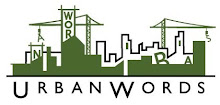I had a really interesting meeting with a writer called Denna Jones a couple of weeks ago. She’s a writer who does work that relates to place, from ‘public art’ residencies to involvement in masterplanning processes. We talked a lot about the importance of the narrative of a place, about how writers can explore and ‘give back’ the lost narratives of a place to the people who inhabit it, engendering pride, conversation, and change.
One thing we also discussed was the focus I have taken so far on the idea of ‘creative writing’. It’s not a term I’m particularly comfortable with, and am becoming less so. As Denna said, all good writing should be creative. I increasingly think that the thing I am interested is story and narrative, and that doesn’t necessarily need to be restricted to the defined spaces of ‘poetry’, ‘prose’, ‘script’ etc. Perhaps what I am interested in is a new kind of writing, that exists outside of the boundaries of literature that I have grown up with and interacted with so far?

